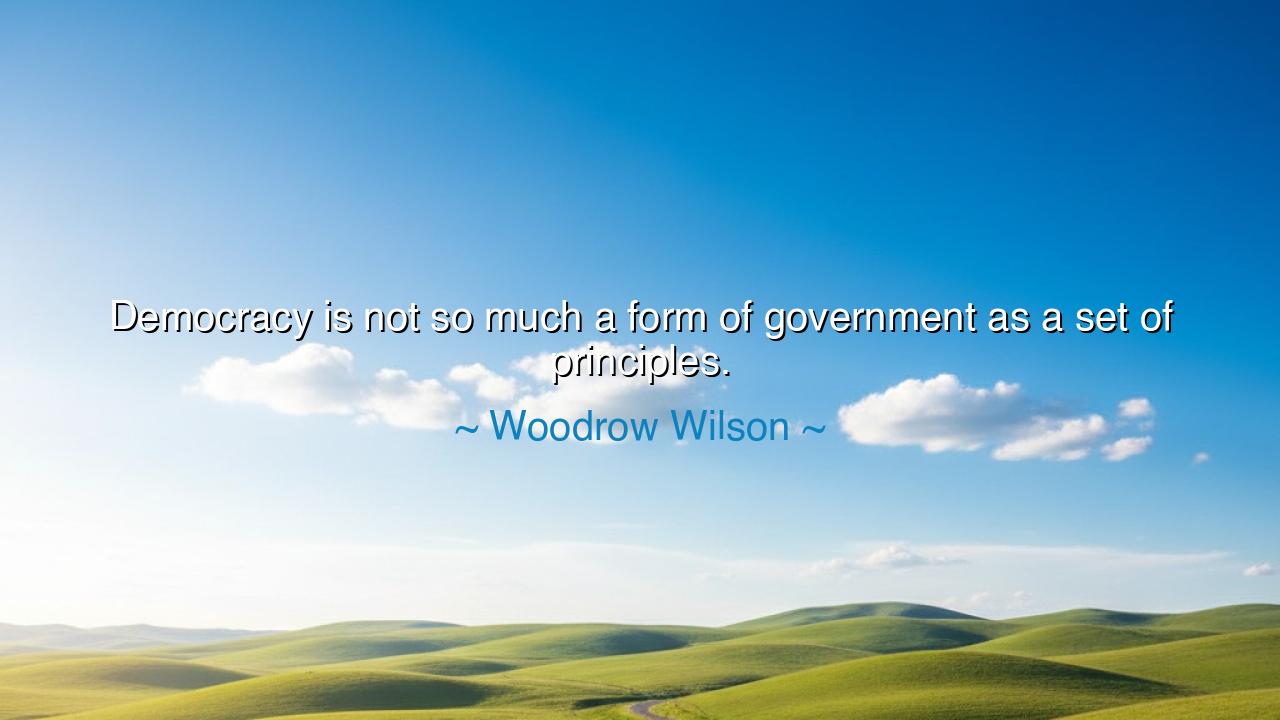
Democracy is not so much a form of government as a set of






In a voice steeped in both intellect and conviction, Woodrow Wilson, the scholar-president who sought to marry ideals with governance, declared: “Democracy is not so much a form of government as a set of principles.” These words, rich with insight, transcend the surface of politics and strike at the very essence of civilization itself. For Wilson reminds us that democracy is not merely a structure of power, a parliament or a constitution—it is a living spirit, a moral covenant between the governed and those who govern. It is not born from laws alone, but from the conscience of a people who believe in equality, justice, and the sacred worth of every soul.
To understand the meaning of this quote, we must cast aside the notion that democracy exists only in institutions. Forms of government may rise and fall—monarchies, republics, empires—but the principles of democracy are eternal. They dwell not in buildings or in ballots, but in hearts. A nation may call itself free, yet if it abandons truth, fairness, and respect for human dignity, its democracy is but an empty shell. Thus, Wilson speaks to a higher truth: that democracy is a moral discipline, not merely a political arrangement. It demands not only freedom, but responsibility—not only voice, but virtue.
The origin of Wilson’s insight lies in his study of history and his experience in the fires of leadership. As president during the First World War, he witnessed how the machinery of government could be twisted by ambition and fear, how nations that once called themselves free could descend into tyranny when principle gave way to pride. To him, democracy was not self-sustaining; it required faith, courage, and constant renewal. His dream was not only of a world governed by laws, but of one guided by principles—mutual respect among nations, justice for the weak, and self-determination for all peoples. Though history would test his idealism, his words endure because they touch a truth older than any war: that democracy is a way of seeing humanity, not merely ruling it.
History itself bears witness to this truth. Consider the story of ancient Athens, the cradle of democracy. There, in the agora, free men gathered to deliberate their laws. Yet even this early democracy was fragile, for it excluded women, slaves, and foreigners from its circle of equality. Its form was democratic, but its principles were incomplete. Centuries later, in America, the same pattern emerged. The founders wrote noble words—“all men are created equal”—but allowed slavery to stain their new republic. The form of democracy existed, yet its principles were not yet whole. Only through generations of struggle—through abolition, suffrage, and civil rights—did the principles begin to breathe life into the form. Wilson’s words echo across these centuries: it is the principles that make democracy real, not the structure that holds it.
And these principles—what are they? They are compassion, equality, accountability, and faith in reason. They are the belief that truth belongs to no single ruler, but to all people in their shared pursuit of justice. They teach that freedom is not license to dominate, but the responsibility to serve. When governments forget these, they decay from within. For tyranny may wear the mask of order, and anarchy may wear the mask of freedom—but both are the enemies of true democracy. Only when the people hold fast to the principles of honesty, humility, and respect for all can their government, in whatever form it takes, remain righteous and strong.
Look to the example of Nelson Mandela, who emerged from the darkness of imprisonment not with bitterness, but with forgiveness. In rebuilding South Africa, he understood that democracy could not be secured through revenge or power alone. It had to be built upon the principles of reconciliation, truth, and equality. In this way, Mandela embodied Wilson’s words, proving that democracy is not merely a system—it is a spirit, one that can exist even in the heart of a single man who refuses to hate. And when that spirit spreads, it transforms not only governments but nations.
Thus, my children of the modern age, learn this: democracy is not preserved by the vote alone, but by the virtues that guide the vote. It is not the constitution that saves a people, but the conscience that upholds it. You must live its principles daily—in your dealings, in your speech, in your mercy toward others. Do not think that democracy dies only in coups and revolutions; it also dies in apathy, in lies, in the small betrayals of truth that corrode the soul of a nation.
And so, remember the wisdom of Woodrow Wilson. The form of government may change, but the principles of democracy are eternal. Defend them not with weapons, but with character; not with slogans, but with sincerity. Let every act of fairness, every defense of truth, every kindness shown to another human being become a stone in the foundation of that great and enduring temple called liberty. For as long as those principles live within the hearts of the people, democracy—true democracy—shall never perish from the earth.






AAdministratorAdministrator
Welcome, honored guests. Please leave a comment, we will respond soon